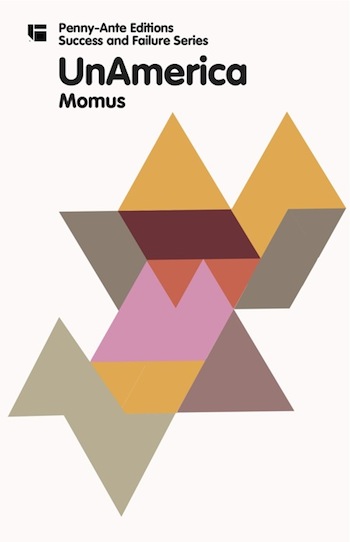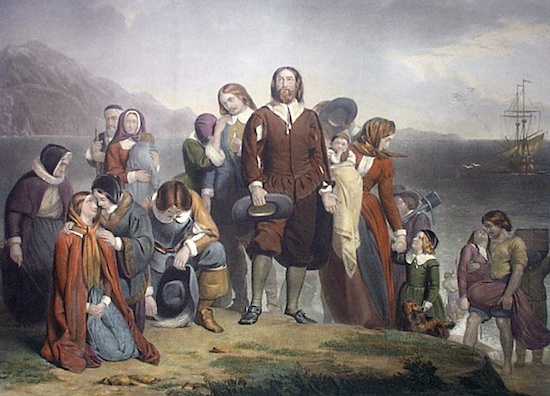In an age of rampant consumerism is the concept of manifest destiny still meaningful today? UnAmerica, Momus’ newest novel answers ironically in the affirmative. Following the book’s protagonist Brad Power through a baroque labyrinth of time travelers and celebrity doppelgangers, God enjoins retail worker Brad to enlist twelve disciples of his choice on a seafaring adventure to find the new promised land, the twenty-first century version of the proverbial city upon a hill. A delirious cousin to Kathy Acker’s Pussy, King of the Pirates and reminiscent of Philip K. Dick’s Valis, UnAmerica retells the allegories of the Old and New Testament with anachronistic brio and humor. Schizophrenic prophets, German cosmonauts, pirate cannibals, ZZ Top, Foucault apologist Hulk Hogan, Shamanic companion animals, a God with late-onset Alzheimers, all populate a book which entertains and intends to bridge the gap between today’s Christianity and the praxis of radical social resistance.
The overlap between the utopian desire and a universal emancipatory project has historically been important for those invested in the philosophical conception of happiness. In a debate going back to Aristotle, those who have claimed to have the key to happiness have argued that it can be categorized in two ways. The first is being happy by inducing temporary hedonistic pleasures; if we define happiness as synonymous with bodily pleasures – no further inquiry is necessary. Happiness, then, is available to practically all of us by simply seeking our favorite recreational substances. Store Manager Randy Lee, one of the many Buddha-adjacent characters in UnAmerica, provides some insight into the former route:
Randy tells me he comes from a privileged family, but has renounced all his entitlements, choosing instead to do a simple job at Willy’s. He says it gives him a clarity he couldn’t otherwise achieve. . . . The luxury with which Randy was surrounded while growing up has convinced him that material wealth, indulgence and involvement represent nothing but pain. Randy was addicted to every harmful substance known to man, he ran with gangs for a while, dealt drugs, pumped himself full of shit, quaffed Jim Beam, . . .
Of course, the downside of such a hedonistic lifestyle are the immediate life-altering consequences. Perhaps the most poignant example in recent memory is that of actor Philip Seymour Hoffman who unexpectedly died early this year of a mixed drug intoxication. In a portentous interview with the philosopher Simon Critchley months before the actor’s drug overdose, Hoffman himself echoing Momus’ sentiments rejected the notion of happiness as pleasure: "I would definitely say that pleasure is not happiness, because I kill pleasure. . . . I take too much of it and therefore I make it unpleasurable, like too much coffee and you’re miserable. I do that to pleasure often. . . . There is no pleasure that I have not made myself actually sick on."
Against the argument of happiness as simple enjoyment, Aristotle in the Nicomachean Ethics suggested that, "He is happy who lives in accordance with complete virtue and is sufficiently equipped with external goods, not for some chance period but throughout a complete life." As Simon Critchley points out, “virtue” in this context is not to be confused with a strictly secular understanding; complete virtue, in the classical sense, is something afforded by the gods. It is precisely with this divine sense of happiness as blessings afforded by the creator that Momus’ book poses fundamental existential questions: What if God, with the birth of modernity, has had a change of heart? What if the Judeo-Christian legacy has finally abandoned its two-century love affair with America? If the Big Other is not omnipotent, then is he like Ulysses or Ahab, an impotent tragic hero subordinated to Fate and Destiny? Have we exhausted the emancipatory political potential of the Abrahamic traditions? –If so, can we start from scratch, as Momus appears to suggest, like Robespierre from year zero, and begin anew from the Absolute beginning?
Reading UnAmerica as a sequel to Darren Aronofsky’s Noah wouldn’t be the worst idea. The common denominator in both narratives is a crew in a vessel traveling the seas to find divinely inspired landmass. All of us have thought at some point in our lives about abandoning this world and seeking authentic happiness. Although this subject matter can appear intrinsically abstract and subjective, Momus has done a workmanlike job of grounding age-old utopian desires into a modern, ironic framework that understands that it takes conscious thought and a certain will to that which is virtuous if we are ever to approach happiness – that is not mediated by consumer capitalism. With the specter of global warming 2.0 and the ecological Armageddon to follow, we may just have to abandon Aristotle’s private belief that happiness consisted of steadily achieving all external goods (i.e., physical health, material wealth, familial integrity, etc). We may just have to take Momus’ lead and join a vessel called the UnAmerica, or Tomorrow for that matter, and start from the red, perhaps even materially beginning from less than nothing, out of debt, into oblivion. If the prospect appears daunting, don’t fret just yet. If Momus’ words are at all divinely inspired we have to take heart in the sociopolitical insight that the new age of Enlightenment will not begin from the familiar landmass we know as North America.
Spoiler alert: “Our heroes will sail a long time on the sea before they next see any land. . . . The crew of the UnAmerica will be hungry now, having exhausted their supplies of IKEA food. . . . until by the will of our dear Lord the cloud shall pass and disperse, and they will see before them a shining lovely continent, and that will be called Eurasia.”

UnAmerica is out now, published by Penny-Ante Editions





